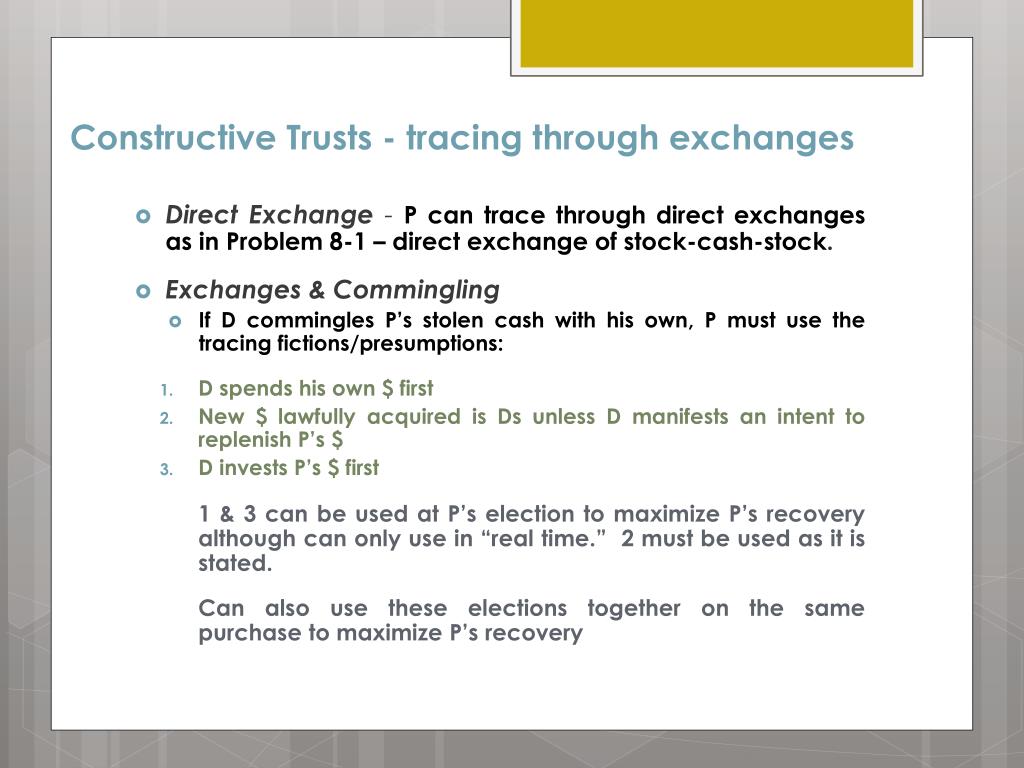Explaining the Fundamentals of What Is A Constructive Trust and Its Legal Use
Explaining the Fundamentals of What Is A Constructive Trust and Its Legal Use
Blog Article
Discovering Just How Does a Positive Trust Fund Operate In Home and Possession Disputes
The principle of a constructive trust works as an important system within home and possession disagreements, resolving scenarios where one event has actually unfairly benefited at the expense of one more. This equitable treatment not only seeks to fix oppressions yet additionally emphasizes the significance of objective and payment in establishing rightful possession. By examining the nuances of how constructive counts on operate, one can reveal the intricacies that commonly arise in legal contexts. What effects do these trusts hold for future disputes, and just how might they affect the landscape of residential property regulation?

Interpretation of Constructive Count On
A constructive trust arises when a court identifies that it is required to avoid unjust enrichment, typically in circumstances where a celebration has acquired home via wrongful ways or under situations that call for equitable alleviation. This legal solution is not formally developed by the events involved; rather, it is imposed by the court to address circumstances where justness and justice need intervention.
Useful trusts are frequently invoked in instances involving scams, violation of fiduciary duty, or other forms of transgression. For example, if a specific wrongfully acquires building that rightfully belongs to an additional, the court may impose a constructive depend guarantee that the wrongdoer holds the home for the benefit of the rightful owner. This legal principle runs on the concept that it would be inequitable for the perpetrator to retain the advantages acquired from their transgression.
Eventually, a constructive trust fund works as a powerful tool in property conflicts, enhancing the idea that possession must reflect not just legal title but additionally moral factors to consider. By identifying the requirement for fair relief, courts make sure that justice prevails in the circulation of building and possessions.
Secret Principles of Positive Depends On
While the application of constructive trust funds might differ depending upon details conditions, several vital principles constantly underpin their enforcement in home conflicts. First of all, the concept of unjust enrichment plays an essential role; a useful trust is commonly imposed to stop one celebration from unfairly benefiting at the cost of an additional. This principle emphasizes the equitable nature of useful counts on, stressing that legal ownership does not always correspond to rightful possession.
Second of all, the requirement of a fiduciary relationship is significant. What Is A Constructive Trust. Useful trust funds regularly arise in contexts where one party has a task to act in the most effective interests of another, such as in partnerships or joint endeavors. Violations of this obligation can trigger the charge of a useful depend protect the aggrieved party's interests
Additionally, the teaching of purpose is essential, as courts consider whether the events intended to produce a trust-like connection, even if not formally recorded. Finally, the principle of fair treatments highlights that constructive counts on serve to provide alleviation that lines up with fairness and justice, guaranteeing that the rightful complaintant can restore building or possessions that they are entitled to, regardless of lawful title residing in other places.
Applications in Home Disputes
Useful trusts discover substantial application in home disputes, especially when resolving issues of ownership and fair rights. These depends on arise in scenarios where one party holds building under conditions that, in fairness and justice, must profit one more event. The equitable remedy of a useful depend on prevents unjust enrichment by acknowledging the payments of a celebration that, despite lacking formal title, has a genuine insurance claim to the residential or commercial property.
One typical situation includes cohabiting companions that add to the acquisition or maintenance of home yet are out the title act. In such instances, the courts might impose a positive depend on to mirror the parties' contributions and intentions, thereby guaranteeing that the non-titled partner receives a reasonable share of the residential property.
Furthermore, useful depends on can be critical in disputes involving inheritance or family members property, where a decedent's intent might not have been officially recorded. Courts may presume a positive depend on to honor the decedent's wishes and fix prospective inequities amongst beneficiaries. Overall, positive counts on work as an essential device in balancing civil liberties and making sure equitable end results in property conflicts, strengthening the principle that justness need to prevail in ownership issues.
Study and Instances
Home disputes involving positive counts on can often be highlighted with real-life study that highlight the complexities and nuances of fair legal rights. One noteworthy instance is * Gissing v. Gissing *, where a partner asserted a useful passion in the family home, suggesting that her monetary payments during the marriage called for a positive count on. The court eventually regulationed in her favor, establishing that her payments developed an equitable rate of interest in spite of the residential property being entirely in her partner's name.
Another illustratory instance is * Thompson v. Thompson *, where siblings disputed the ownership of a household estate after their moms and dads' passing away. One brother or sister had actually maintained and improved the residential property, insisting that these actions validated a useful depend on. The court identified the brother or sister's efforts and found that a positive trust was required to stop unjustified useful site enrichment, hence granting them a share in the estate.
These cases exemplify how constructive counts on serve to deal with situations where legal ownership does not reflect real fair passions of the celebrations entailed, stressing the significance of intent and payments in figuring out rightful claims in property conflicts.
Lawful Ramifications and Considerations
Various lawful ramifications and considerations emerge when addressing useful rely on property conflicts. Foremost, the establishment of a useful trust fund usually rests on the presence of an unjustified enrichment, wherein one party benefits at the cost of an additional. This concept necessitates a thorough evaluation of the connection in between the events and the scenarios that brought about the supposed injustice.
In addition, courts typically call for clear proof of the plaintiff's payment to the residential property or possession concerned, which can consist of economic investments, labor, or other types of assistance. The concern of evidence resides the complaintant, necessitating meticulous paperwork and testament to confirm their insurance claims.
Moreover, the timing of claims is important, as statutes of limitations might restrict the ability to establish a constructive trust after a particular duration. Legal guidance should navigate these time constraints thoroughly to guarantee that this website claims are filed in a prompt way.
Finally, the potential for disagreements over the intent behind residential property transfers can make complex issues better, requiring a nuanced understanding of both statutory regulation and situation regulation to efficiently promote for a client's rate of interests in positive depend on claims.
Conclusion

The principle of a constructive depend on offers as an essential mechanism within home and property disagreements, dealing with scenarios where one party has unfairly benefited at the expenditure of another. If a private wrongfully takes ownership of property that rightfully belongs to one more, the court might enforce a positive trust to guarantee that the perpetrator holds the home for the advantage of the rightful owner.Useful depends on find considerable application in residential property disagreements, especially when attending to concerns of ownership and equitable legal rights. On the whole, useful depends on offer as an important tool in balancing legal rights and making certain fair results in residential or commercial property disputes, enhancing the principle that fairness must dominate in ownership matters.
In summary, positive depends on serve as vital fair solutions in home and property conflicts, dealing with unjustified enrichment by acknowledging the contributions of events included. - What Is A Constructive Trust
Report this page